Arts & Entertainment
‘Think of those who have not been seen,’ Cynthia Erivo’s powerful message at GLAAD Awards
Erivo and Doechii delivered powerful acceptance speeches

GLAAD celebrated its 40th anniversary with a star-studded gala in Beverly Hills, honoring achievements in LGBTQ media and entertainment, while pushing back at efforts nationwide to turn back civil rights protections, restrict and erase transgender identities.
Doechii accepted a GLAAD Media Award for outstanding music artist, Harper Steele won for outstanding documentary for Will & Harper and Nava Mau was honored with the outstanding series – limited anthology award for Baby Reindeer.
Those in attendance rose for a long and enthusiastic standing ovation as the prestigious Stephen F. Kolzak Award was presented to Cynthia Erivo.
“It isn’t easy. None of it is, waking up and choosing to be yourself, proclaiming a space belongs to you when you don’t feel welcomed,” said Erivo.
The 38-year-old queer Oscar nominee and Emmy, Tony and Grammy winner delivered a moving acceptance speech, in which she thanked GLAAD but also called on the audience to do more to help those in the community who have not yet come out. Video of her remarks has gone viral on Instagram.
“Here in this room, we have all been the recipients of the gift that is the opportunity to be more. I doubt that it has come easy to any of us, but more, for some, the road has not been one paved with yellow bricks, but instead paved with bumps and potholes. Whichever road you have traveled, how beautiful it is that you’ve had a road to travel on at all. There are the invisible ones who have had no road at all. For those who have not
yet even begun to find the road, be encouraged and be patient with yourself, it will show itself,” Erivo said. Then she paused from reading the speech that was in the teleprompter, and ad libbed a poetic, closing message.
“We use the phrase ‘out and proud,’ and though you might not have the strength or capacity to do that now, know that I am proud of your quiet and solitary want to be just that,” she said, and then addressed the community ahead of Transgender Day of Visibility. “We are all visible. We can be seen. We see each other. I see you, you see me. But think of those who have not been seen, think of those who sit in the dark and wait their turn, hoping and waiting for a light to light their path. I ask every single one of you in this room, with the spaces that you’re in, and the lights that you hold, to point it in the direction of someone who just needs a little guidance.”
Broadway legend Patti LuPone offered guidance from queer icons, past and present, when she took the stage to recite inspiring quotes that brought the house down.
“I can no longer accept the things I cannot change. I am changing the things I cannot accept,” LuPone quoted lesbian, feminist, activist Angela Davis. “Coming out is the most political thing you can do,” she said, quoting Harvey Milk.
Then LuPone cited some of the stars of Drag Race, including Valentina, Kennedy Davenport, Alyssa Edwards, Trixie Mattel, Plane Jane, and Latrice Royale. But it was the words of OG Drag Race alumna Bianca Del Rio that got the crowd on its feet: “Not today, Satan. Not today!”
“Right now, LGBTQ+ rights are under attack, but what they take from us, they take from you too,” said Brian Michael Smith, upon winning the award for outstanding drama series for 911: Lone Star. “These aren’t isolated rollbacks; they’re attacks on all of our civil rights. This kind of representation is more than visibility, it’s resistance.”
When Doechii accepted the trophy for outstanding music artist at the ceremony, the “Denial Is a River” rapper commented on this politically charged moment for the LGBTQ community, as she praised GLAAD for its principles of “acceptance, inclusiveness and empowerment.”
“Those are the same things I strongly believe in and advocate for and that continue to propel me forward, especially now that hard-won cultural change and rights for transgender people and the LGBTQ community have been threatened,” said Doechii. “And I am disgusted. Disgusted. But I want to say that we are here and we are not going anywhere.”
“These kinds of events help me to feel support, to feel like we’re a team working together to make ourselves feel more seen, make others feel more seen, and there’s so much still to celebrate,” said singer songwriter David Archuleta, the American Idol alum who made headlines in 2021 when he came out and quit the Mormon Church. On the red carpet before the gala, he shared with the Los Angeles Blade his advice to fans who want to find joy amid the gloom: “I love to go dance. Dance is so therapeutic. It’s a place where you can just shake it off, feel hot, go out, and that’s a therapeutic way.”
“This is where I find joy,” Michaela Jaé Rodriguez told the Blade. “But the best times where I find even more joy is learning what state we’re in. Learning how I can fire myself, put a fire behind me, and stay as vigilant as possible and be in the forefront and never disappear. And I want to encourage that to a lot of my young individuals out there. Don’t disappear. Stand out, be proud, and don’t be scared. I’m not scared!”
“It feels amazing, being surrounded by basically my own people is always like a big warm hug, so I love it,” Harper Steele told the Blade.
The writer, who took home a GLAAD trophy for her award-winning documentary with her friend and fellow SNL alum Will Ferrell, noted that despite the joy of the evening, she was “very sad” about political moves targeting the transgender community in Washington, D.C. as well where she grew up in Iowa.
“My own home state, who gave me trans protections and rights, just took them away,” Steele told the Blade. “We’re the first group that’s ever had those rights taken away from us, so we’re in a weird time. I’m going to keep doing the best I can to convince people that they’re wrong. Not only are they wrong, but they’re being stupid.”
The Washington Blade was nominated for its coverage of the 2024 Summer Olympics Games, ”Paris Olympics: More queer athletes, more medals, more Pride, less Grindr,” in the category of outstanding print article. The winner was “‘Changing The Narrative’: Advocates Fight HIV Stigma in Dallas’ Latino Community” by Abraham Nudelstejer of The Dallas Morning News. The Advocate won for outstanding magazine overall coverage, and Jo Yurcaba of NBC Out won for “Friends Remember Nex Benedict, Oklahoma Student Who Died After School Fight, as ‘Fiery Kid.’”
The Blade also spoke to GLAAD President and CEO Sarah Kate Ellis on the red carpet.
Ellis and the organization survived a difficult challenge in 2024 when Ellis herself came under fire from The New York Times for what it called “lavish” spending. It should be noted that in a one-on-one conversation with Variety in October, Ellis pointed out that The Times report omitted mention of GLAAD’s multi-year campaign that called attention to the newspaper’s unbalanced coverage of issues related to transgender Americans and gender-affirming care, and that any spending issues raised by the report — seen by many as a hit piece in retaliation for GLAAD’s campaign — had already been addressed “two years ago.”
Ellis told the Blade she remains focused on GLAAD’s mission to advance acceptance of the LGBTQ community in media.
“I think tonight for me is about getting everybody together to talk about our stories, how important they are, and make sure that we are plastering the airwaves with our stories. And I think it’s about moving forward and having a plan. We have a plan at GLAAD. We understand what’s happened to this media ecosystem and we’re forging forward.”
Ellis spoke passionately about the challenge the nonprofit faces in 2025 and beyond.
“I think the media ecosystem has changed so dramatically and tectonically in a short period of time, “ she said. “We’re seeing that right-wing media gets about 100 million people a week. Progressive media reaches 30 million people a week. So, we have a 70 million person gap, and that gap is why we’re losing presidential campaigns, why we’re losing the narrative, why our community is under siege. We have to close that gap.”
Read the full list of nominees and winners of this year’s GLAAD Media Awards here.
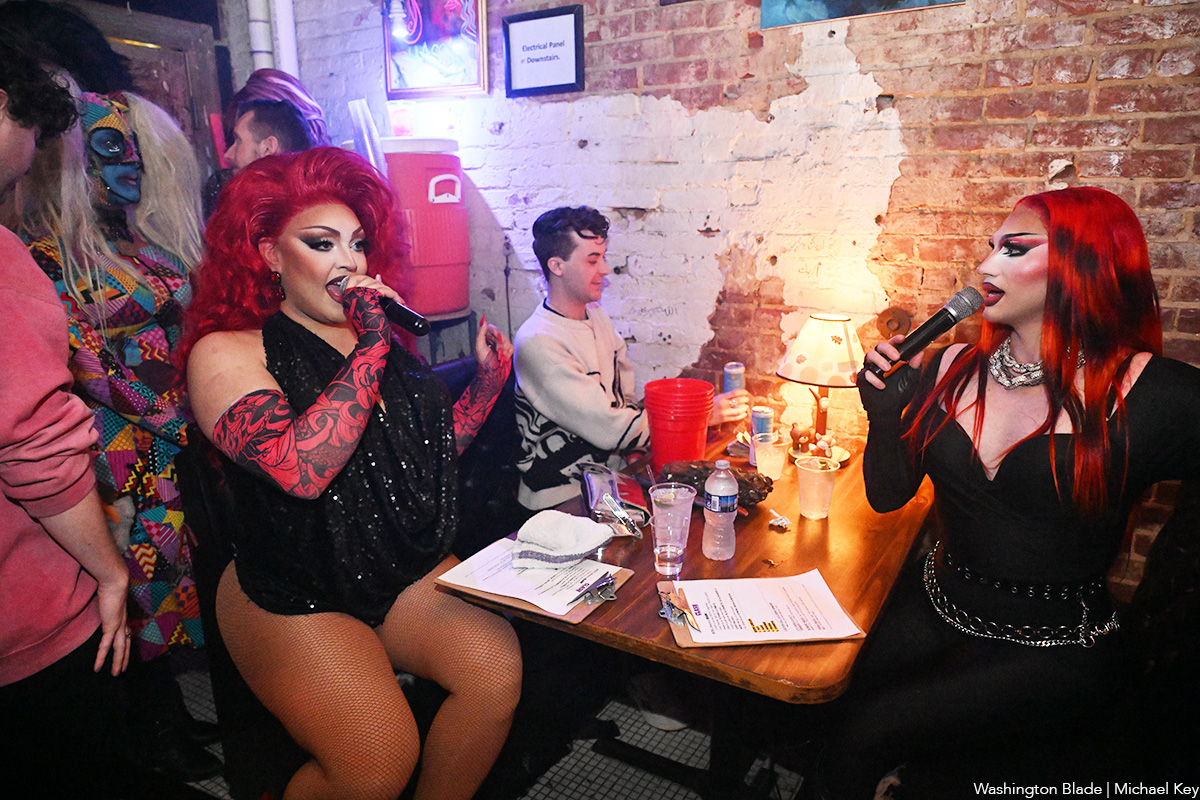
Crimsyn and Tatianna hosted the new weekly drag show Clash at Trade (1410 14th Street, N.W.) on Feb. 14, 2026. Performers included Aave, Crimsyn, Desiree Dik, and Tatianna.
(Washington Blade photos by Michael Key)
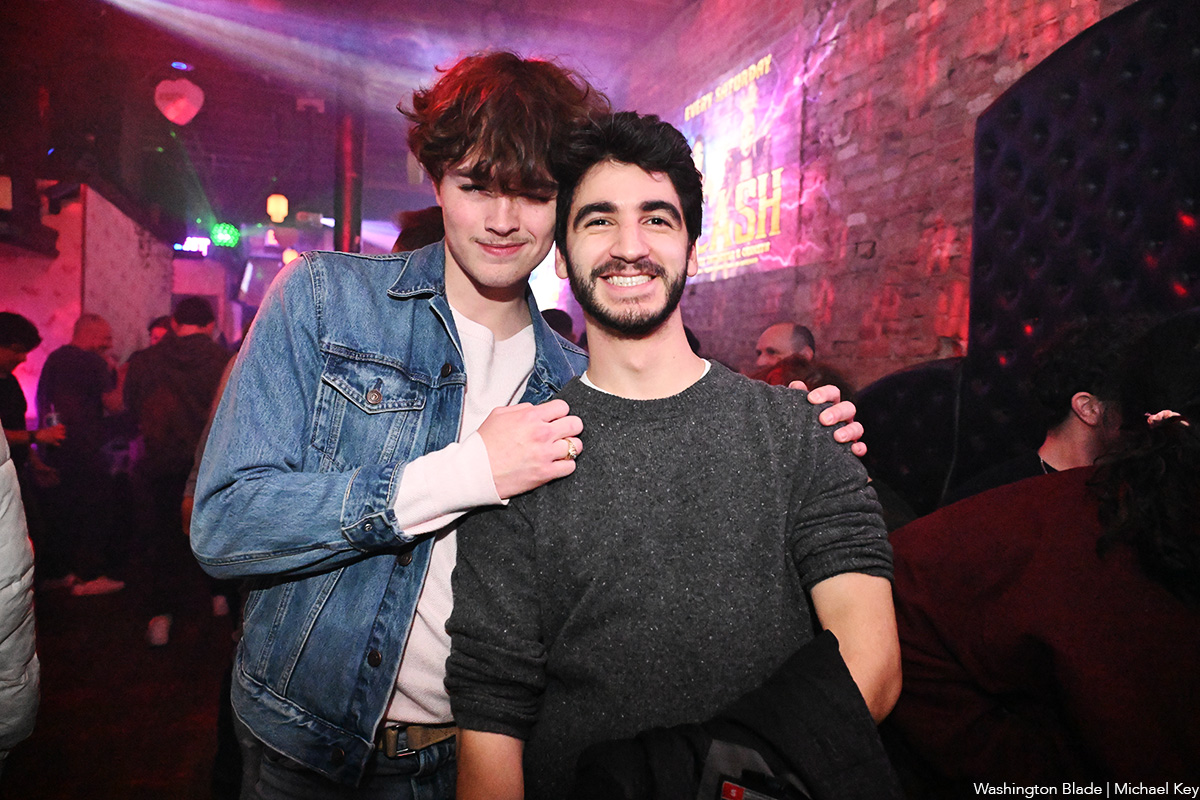
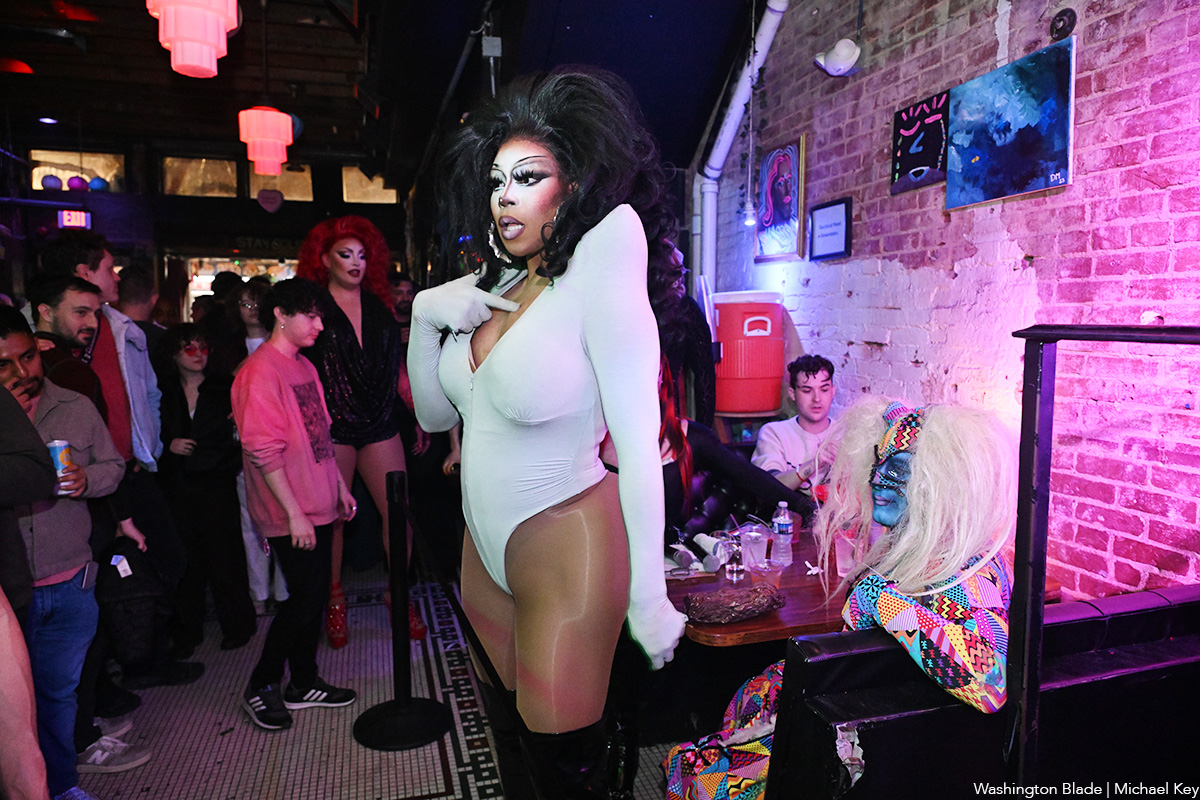
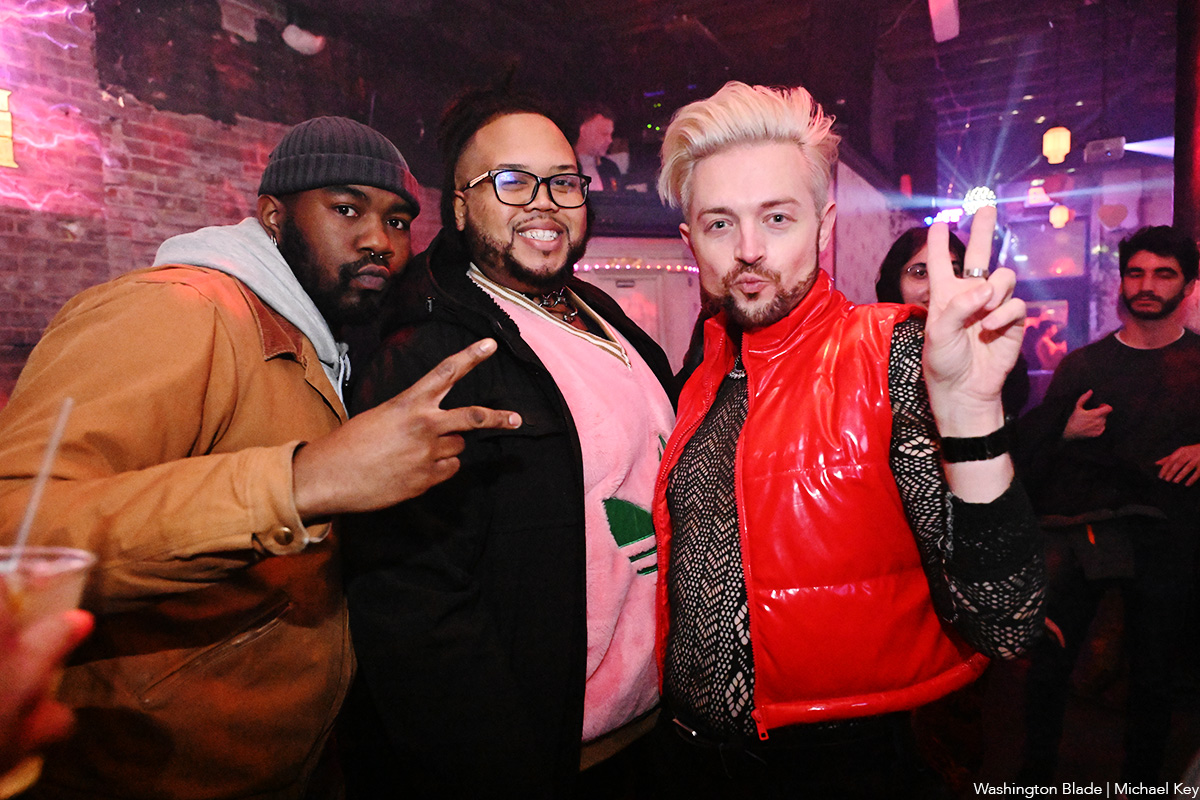
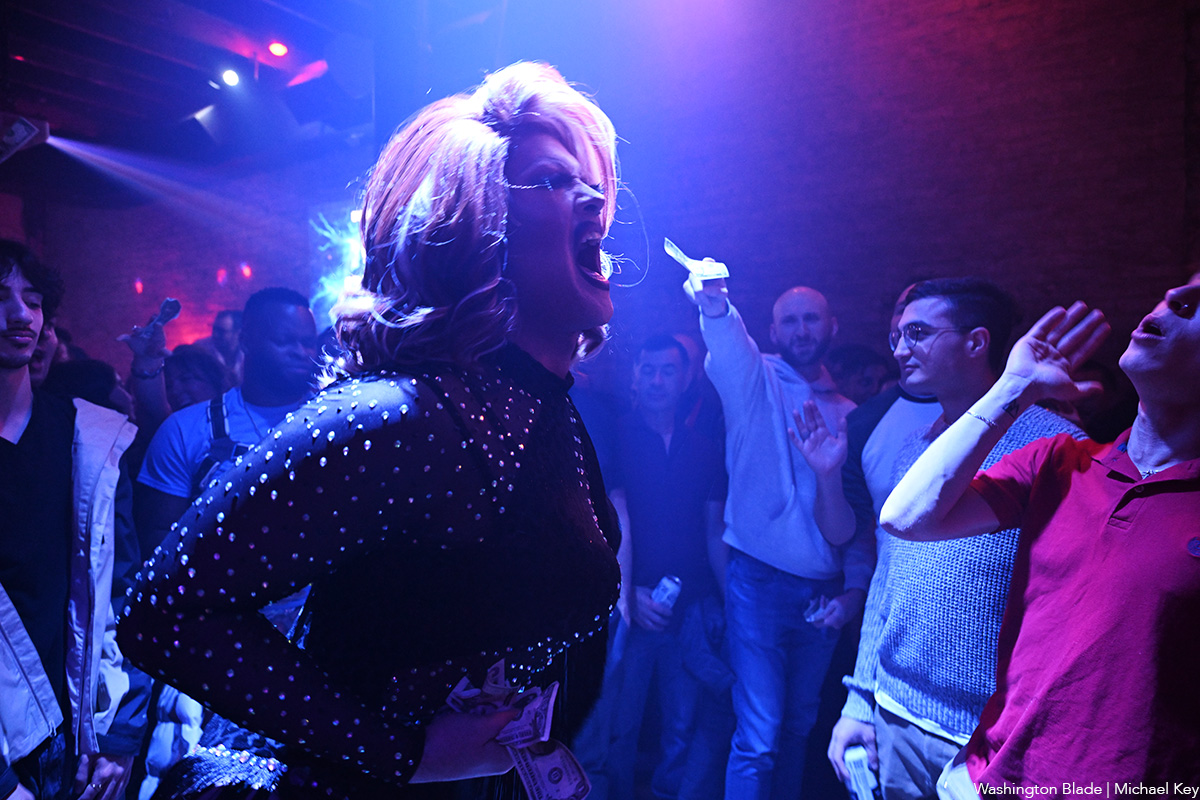
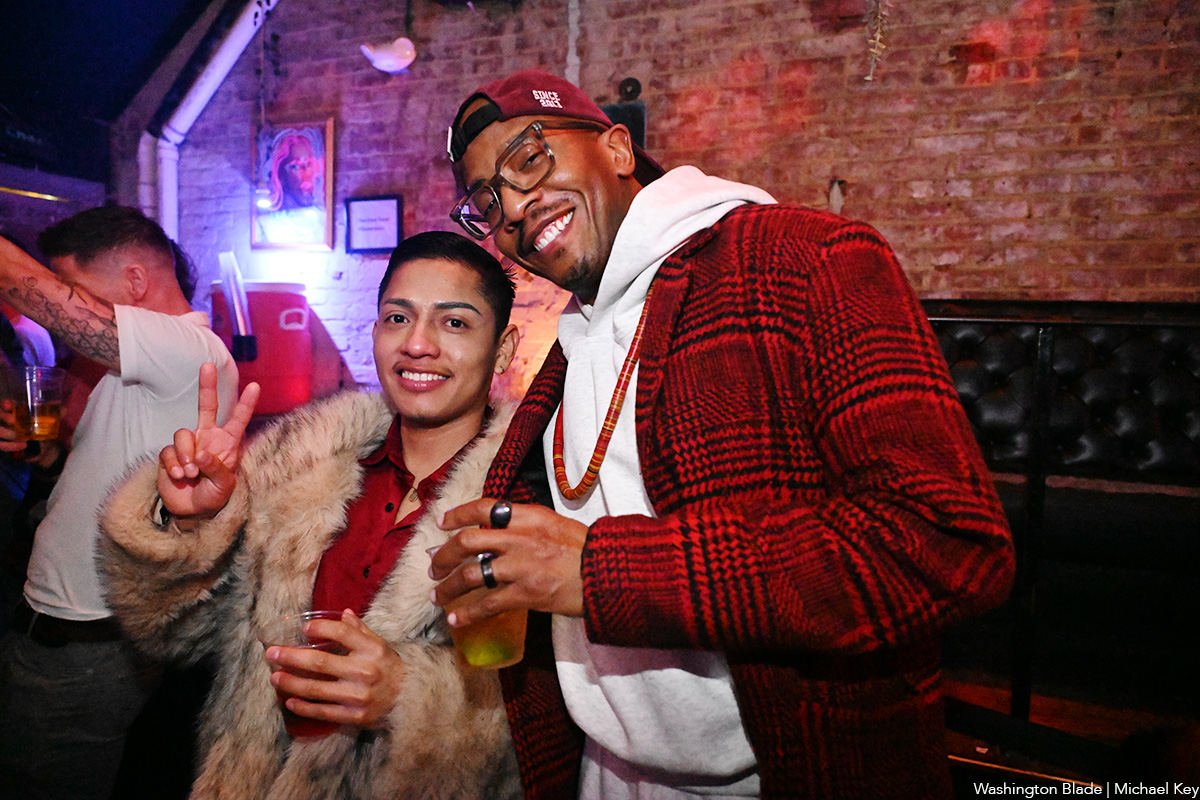
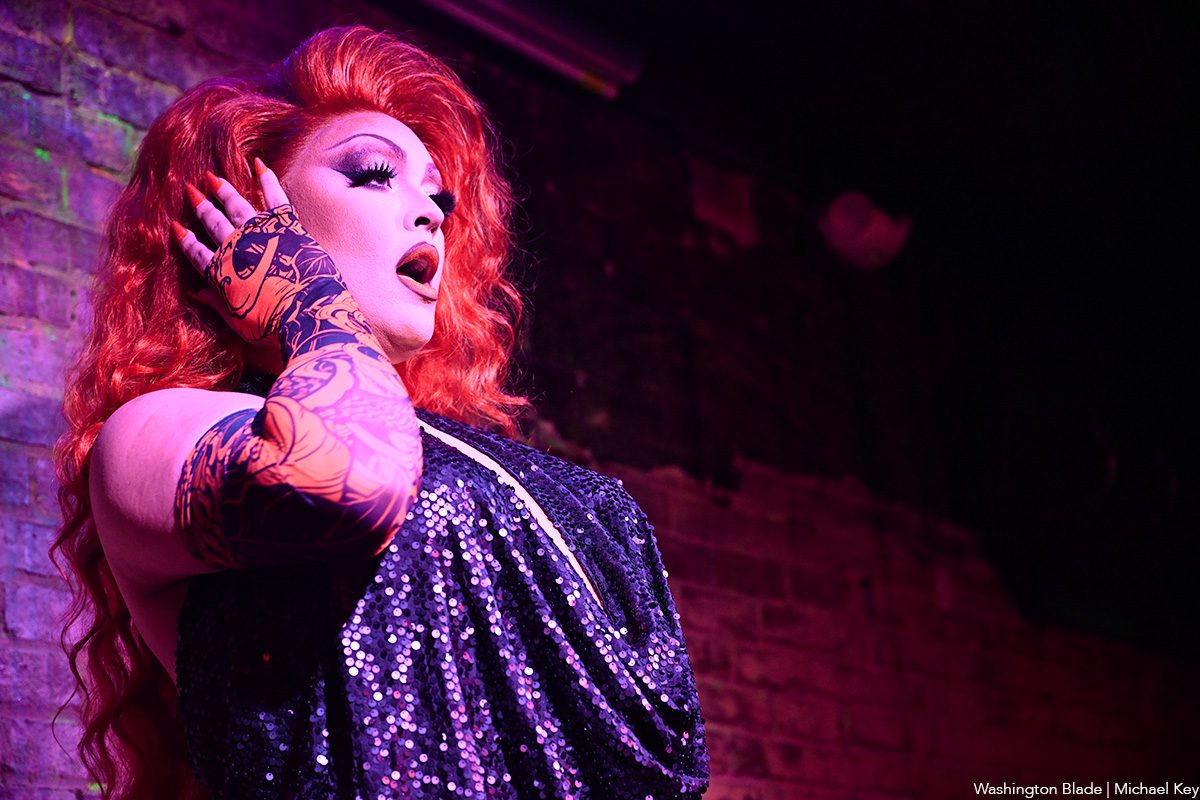
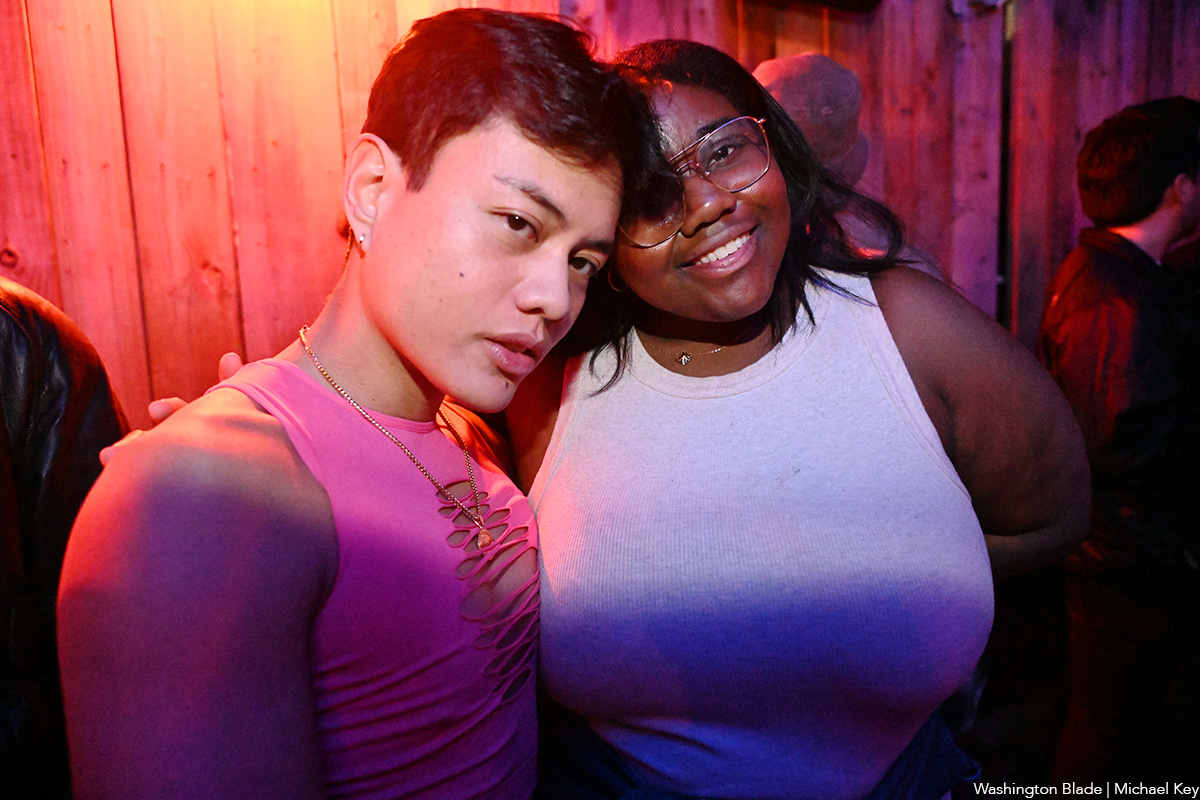
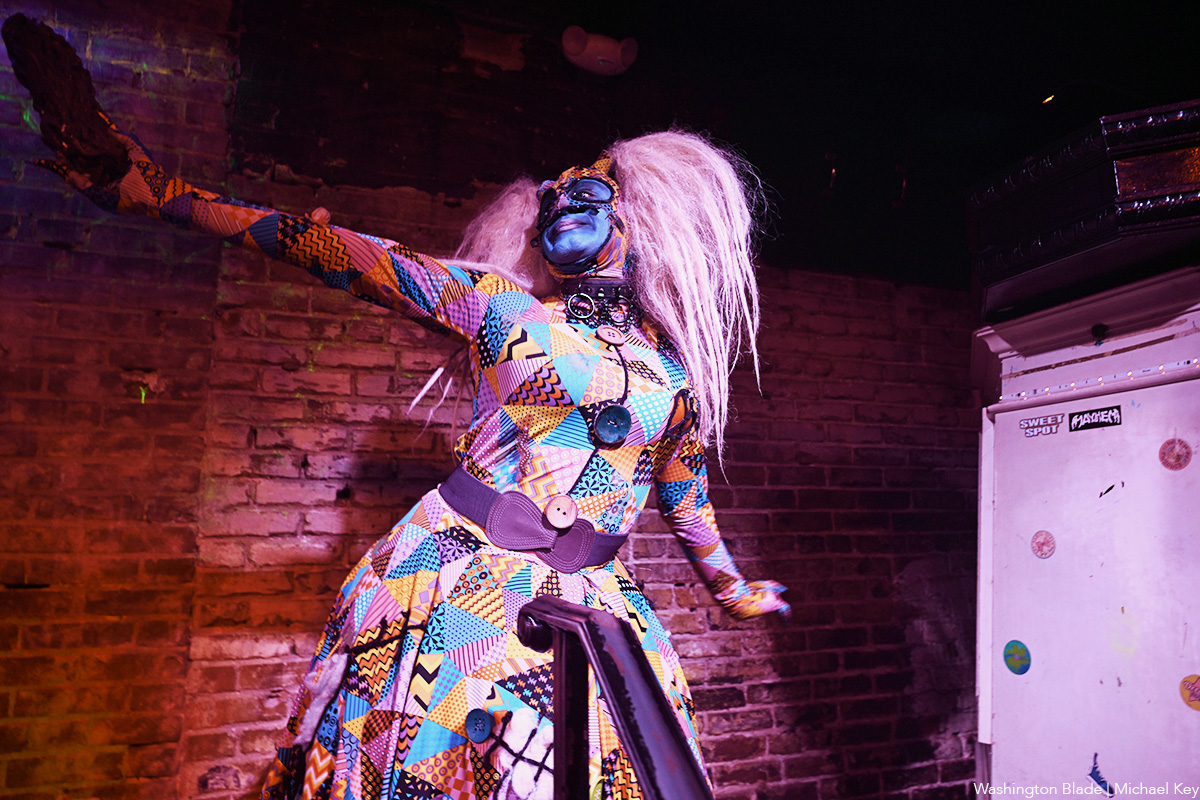
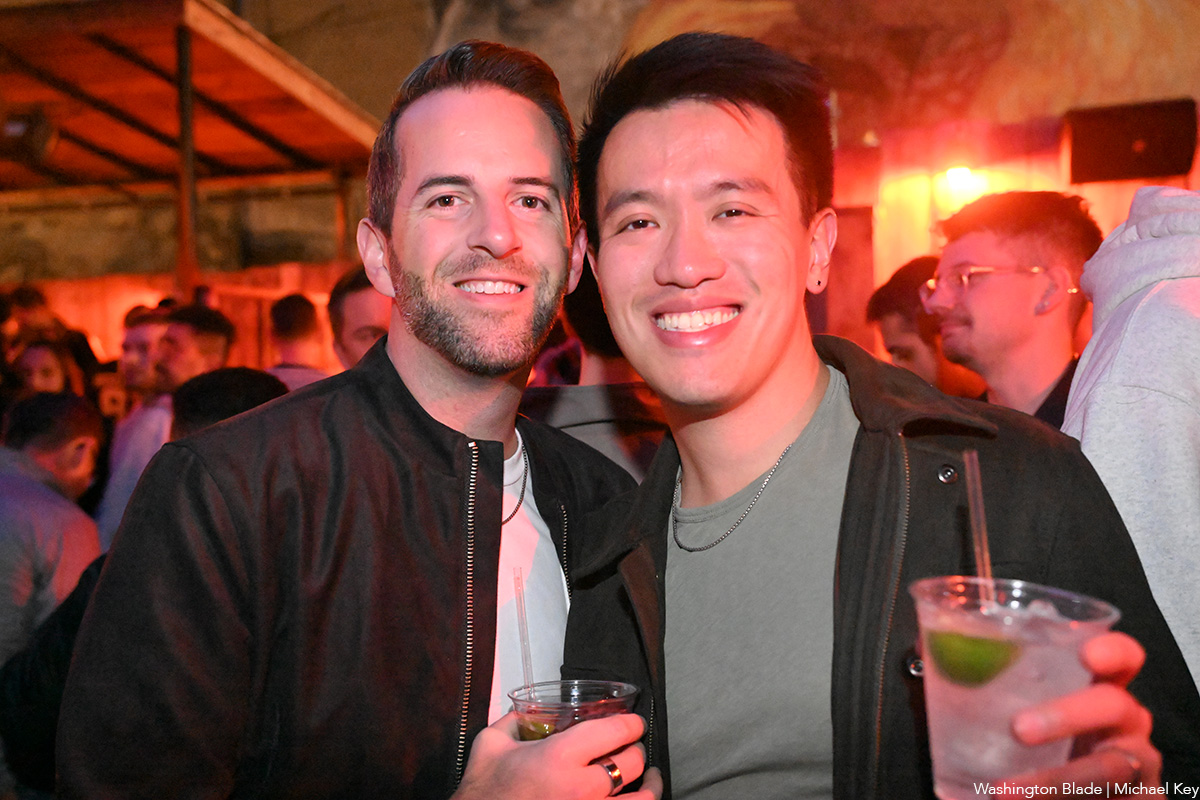
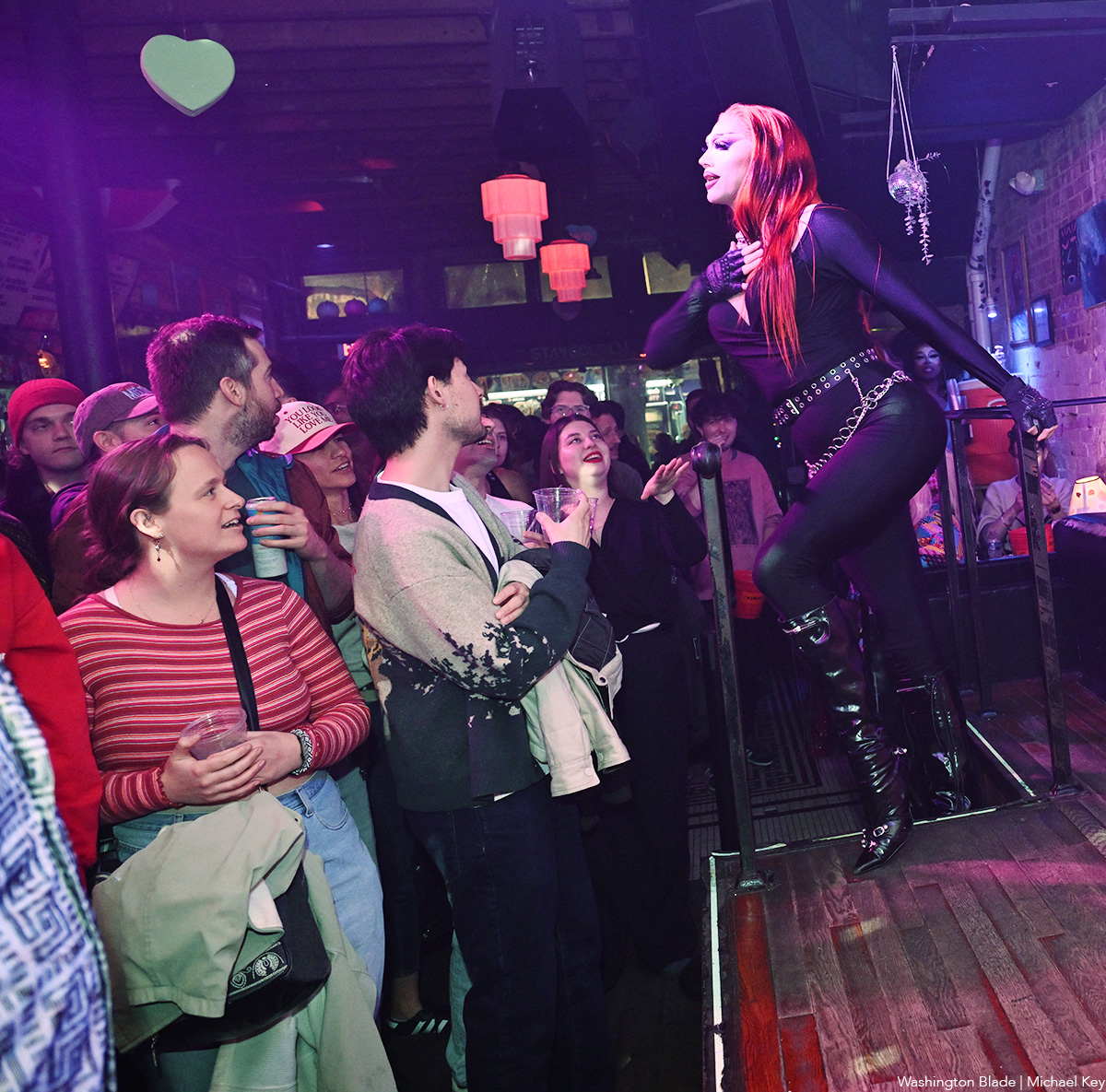
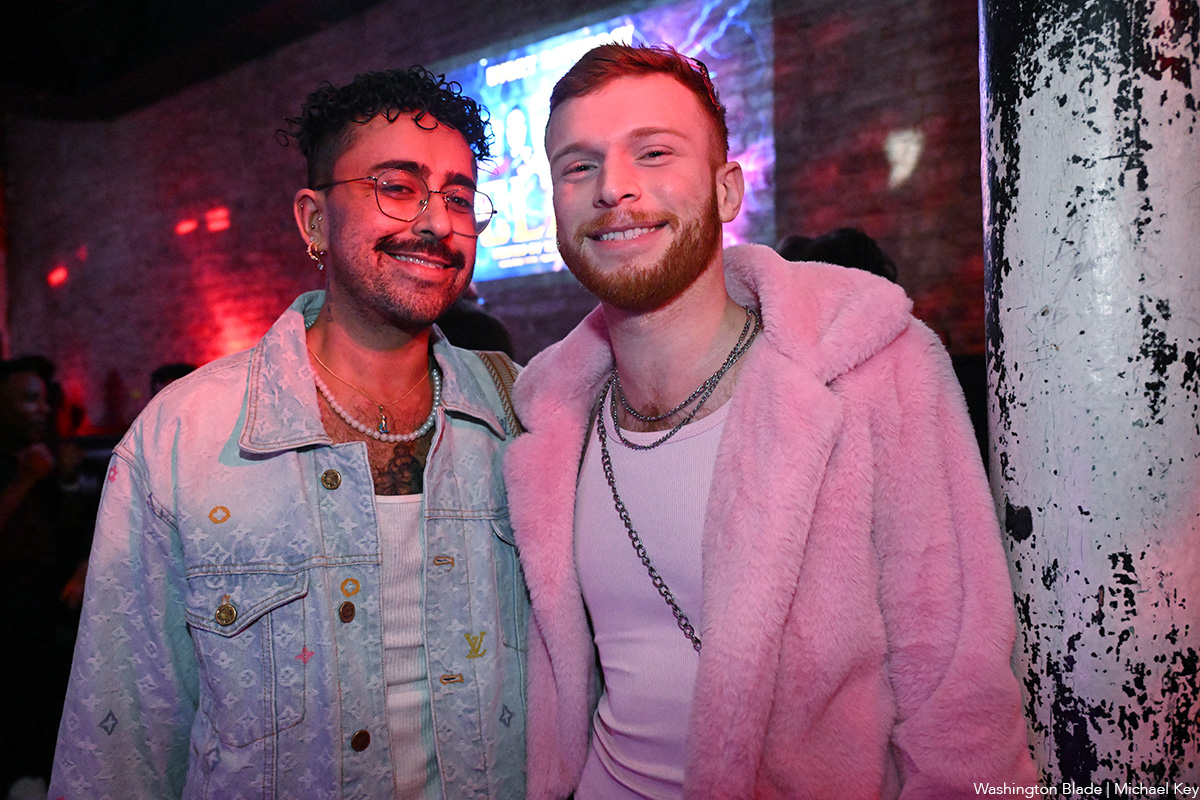
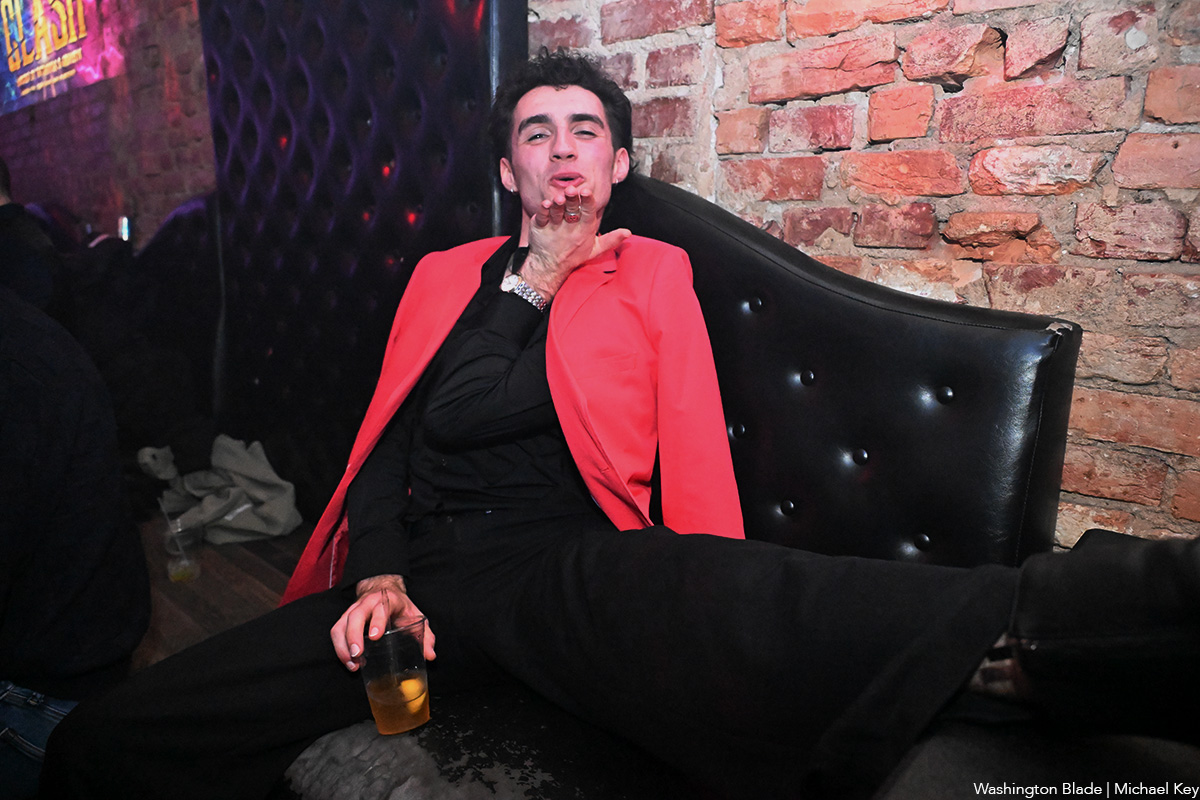
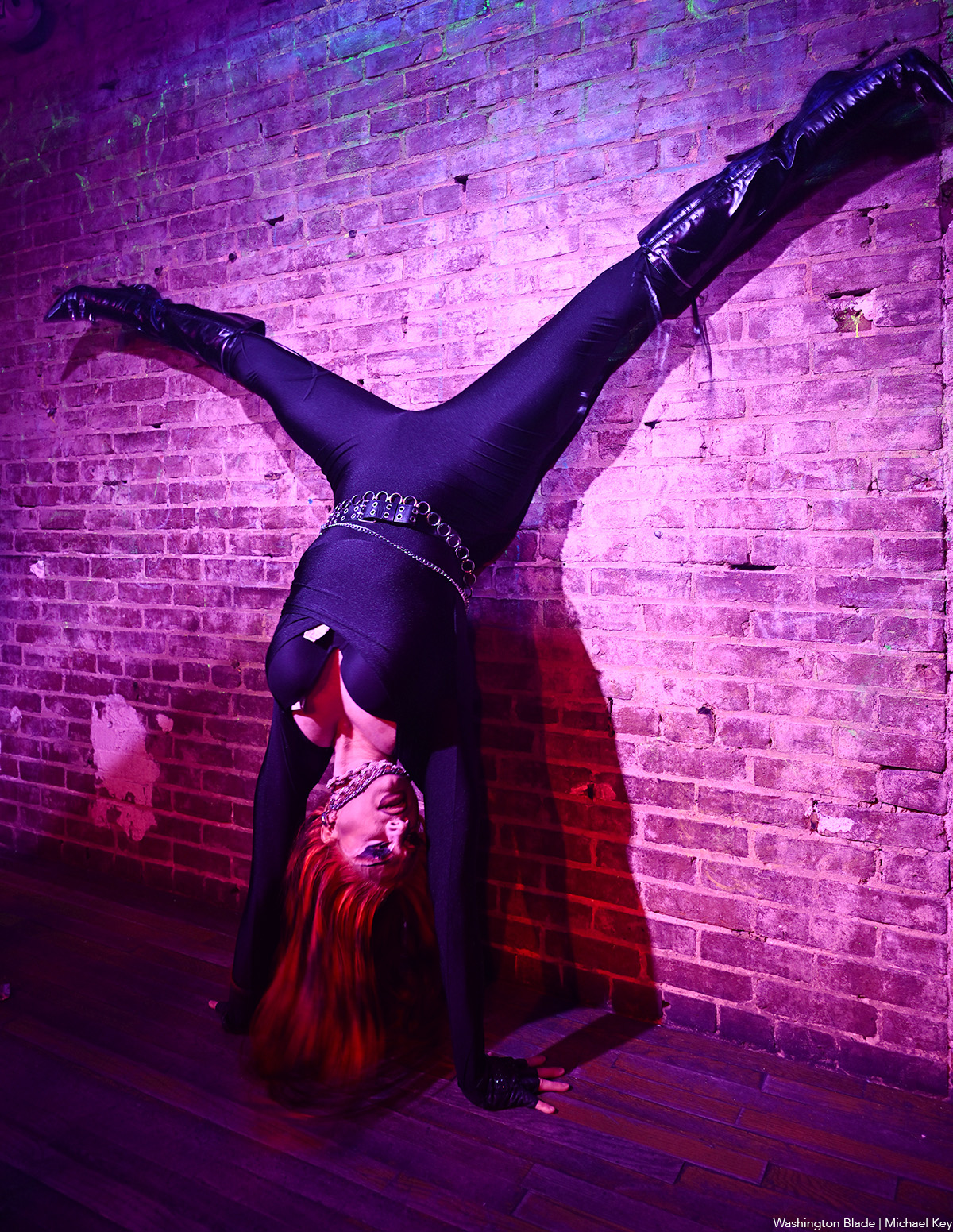
Theater
Magic is happening for Round House’s out stage manager
Carrie Edick talks long hours, intricacies of ‘Nothing Up My Sleeve’

‘Nothing Up My Sleeve’
Through March 15
Round House Theatre
4545 East-West Highway
Bethesda, Md. 20814
Tickets start at $50
Roundhousetheatre.org
Magic is happening for out stage manager Carrie Edick.
Working on Round House Theatre’s production of “Nothing Up My Sleeve,” Edick quickly learned the ways of magicians, their tricks, and all about the code of honor among those who are privy to their secrets.
The trick-filled, one-man show starring master illusionist Dendy and staged by celebrated director Aaron Posner, is part exciting magic act and part deeply personal journey. The new work promises “captivating storytelling, audience interaction, jaw-dropping tricks, and mind-bending surprises.”
Early in rehearsals, there was talk of signing a non-disclosure agreement (NDA) for production assistants. It didn’t happen, and it wasn’t necessary, explains Edick, 26. “By not having an NDA, Dendy shows a lot of trust in us, and that makes me want to keep the secrets even more.
“Magic is Dendy’s livelihood. He’s sharing a lot and trusting a lot; in return we do the best we can to support him and a large part of that includes keeping his secrets.”
As a production assistant (think assistant stage manager), Edick strives to make things move as smoothly as possible. While she acknowledges perfection is impossible and theater is about storytelling, her pursuit of exactness involves countless checklists and triple checks, again and again. Six day weeks and long hours are common. Stage managers are the first to arrive and last to leave.
This season has been a lot about learning, adds Edick. With “The Inheritance” at Round House (a 22-week long contract), she learned how to do a show in rep which meant changing from Part One to Part Two very quickly; “In Clay” at Signature Theatre introduced her to pottery; and now with “Nothing Up My Sleeve,” she’s undergoing a crash course in magic.
She compares her career to a never-ending education: “Stage managers possess a broad skillset and that makes us that much more malleable and ready to attack the next project. With some productions it hurts my heart a little bit to let it go, but usually I’m ready for something new.”
For Edick, theater is community. (Growing up in Maryland, she was a shy kid whose parents signed her up for theater classes.) Now that community is the DMV theater scene and she considers Round House her artistic home. It’s where she works in different capacities, and it’s the venue in which she and actor/playwright Olivia Luzquinos chose to be married in 2024.
Edick came out in middle school around the time of her bat mitzvah. It’s also around the same time she began stage managing. Throughout high school she was the resident stage manager for student productions, and also successfully participated in county and statewide stage management competitions which led to a scholarship at the University of Maryland, Baltimore County (UMBC) where she focused on technical theater studies.
Edick has always been clear about what she wants. At an early age she mapped out a theater trajectory. Her first professional gig was “Tuesdays with Morrie” at Theatre J in 2021. She’s worked consistently ever since.
Stage managing pays the bills but her resume also includes directing and intimacy choreography (a creative and technical process for creating physical and emotional intimacy on stage). She names Pulitzer Prize winning lesbian playwright Paula Vogel among her favorite artists, and places intimacy choreographing Vogel’s “How I learned to Drive” high on the artistic bucket list.
“To me that play is heightened art that has to do with a lot of triggering content that can be made very beautiful while being built to make you feel uncomfortable; it’s what I love about theater.”
For now, “Nothing Up My Sleeve” keeps Edick more than busy: “For one magic trick, we have to set up 100 needles.”
Ultimately, she says “For stage managers, the show should stay the same each night. What changes are audiences and the energy they bring.”

Friday, February 13
Center Aging Monthly Luncheon With Yoga will be at noon at the DC Center for the LGBT Community. Email Mac at [email protected] if you require ASL interpreter assistance, have any dietary restrictions, or questions about this event.
Go Gay DC will host “LGBTQ+ Community Happy Hour Meetup” at 7 p.m. at Freddie’s Beach Bar and Restaurant. This is a chance to relax, make new friends, and enjoy happy hour specials at this classic retro venue. Attendance is free and more details are available on Eventbrite.
Women in their Twenties and Thirties will be at 7 p.m. on Zoom. This is a social discussion group for queer women in the D.C. area. For more details, visit the group on Facebook.
Saturday, February 14
Go Gay DC will host “LGBTQ+ Community Brunch” at 11 a.m. at Freddie’s Beach Bar & Restaurant. This fun weekly event brings the DMV area LGBTQ community, including allies, together for delicious food and conversation. Attendance is free and more details are available on Eventbrite.
The DC Center for the LGBT Community will host a screening of “Love and Pride” at 1:30 p.m. This event is a joy-filled global streaming celebration honoring queer courage, Pride, and the power of love. It’s a bold celebration of courage and community — a fearless reminder of what we’ve overcome, how love is what makes us unstoppable, and how we have always turned fear into fierce. For more details, visit the Center’s website.
Sunday, February 15
LGBTQ+ Community Coffee and Conversation will be at 12 p.m. at As You Are. This event is for people looking to make more friends and meaningful connections in the LGBTQ community. Attendance is free and more details are available on Eventbrite.
Monday, February 16
Queer Book Club will be at 7:00p.m. on Zoom. This month’s read is “Faebound” by Saara El-Arifi. For more details, visit the DC Center’s website.
“Center Aging: Monday Coffee Klatch” will be at 10 a.m. on Zoom. This is a social hour for older LGBTQ+ adults. Guests are encouraged to bring a beverage of choice. For more information, contact Adam ([email protected]).
Tuesday, February 17
Center Bi+ Roundtable will be at 7 p.m. on Zoom. This is an opportunity for people to gather in order to discuss issues related to bisexuality or as Bi individuals in a private setting.Visit Facebook or Meetup for more information.
Wednesday, February 18
Job Club will be at 6 p.m. on Zoom upon request. This is a weekly job support program to help job entrants and seekers, including the long-term unemployed, improve self-confidence, motivation, resilience and productivity for effective job searches and networking — allowing participants to move away from being merely “applicants” toward being “candidates.” For more information, email [email protected] or visit thedccenter.org/careers.
Thursday, February 19
The DC Center’s Fresh Produce Program will be held all day at the DC Center for the LGBT Community. To be fair with who is receiving boxes, the program is moving to a lottery system. People will be informed on Wednesday at 5 p.m. if they are picked to receive a produce box. No proof of residency or income is required. For more information, email [email protected] or call 202-682-2245.
Virtual Yoga Class will be at 7 p.m. on Zoom. This free weekly class is a combination of yoga, breath work and meditation that allows LGBTQ+ community members to continue their healing journey with somatic and mindfulness practices. For more details, visit the DC Center’s website.

















